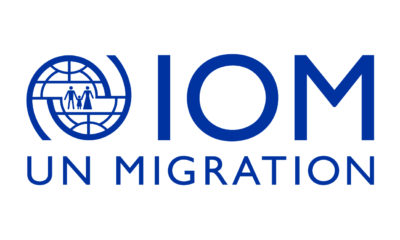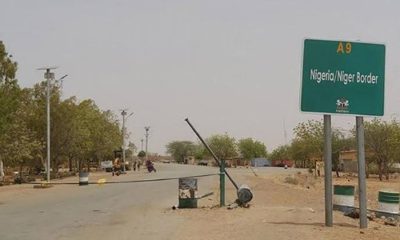International News
France Shuts Down Niger Embassy

Amid escalating tensions between France and Niger, the French embassy in Niger has announced its indefinite closure.
Citing restrictions imposed by Niger’s military government, the embassy expressed its inability to operate normally or carry out its duties.
Former French ambassador Sylvain Itté mentioned in a letter that local embassy staff had also been dismissed.
Concurrently, the departure of the final French troops from Niger follows the orders of the country’s military leaders.
Niger’s association with France has deteriorated following the ousting of President Mohamed Bazoum by the military in July.
In September, former ambassador Mr. Itté and various French personnel departed the country.
This move came a month after the military regime demanded the ambassador’s departure and established a blockade around the embassy compound in Niamey, the capital.
Following the coup, the embassy faced an attack by thousands of pro-junta protestors, but they were thwarted by Nigerien forces before breaching the building.
During Mr. Bazoum’s tenure, France maintained over 1,500 troops in Niger, aiding in the combat against jihadist factions associated with both al-Qaeda and the Islamic State.
The majority of the troops had departed before the Friday deadline, and the final 157 have now completed their withdrawal.
There are worries that France’s exit could exacerbate the security landscape in the region, which is experiencing heightened assaults by Islamist militants.
To counter the insurgency, Niger’s junta has forged a fresh defense alliance with neighboring Burkina Faso and Mali.
Similar to Niger, these nations are former French colonies where the military has taken control in recent times.
Anti-French sentiment has surged, with the former colonial power being held responsible for its perceived failure in stemming Islamist assaults.
Additionally, France has been accused of maintaining disproportionate political and economic control long after independence.
In contrast, the United States maintains two military bases in Niger, housing over 600 American troops.
The US views its military presence in Niger as essential to counter the expanding influence of Russia’s Wagner mercenary group in the Sahel region of West Africa.
In Mali, the military junta collaborates with Wagner mercenaries in combating jihadists, despite accusations against the group for extensive human rights violations.
International News
Turkish Model Arrested Over Plan To Sleep With 100 Men In 24 Hours
A 23-year-old Turkish OnlyFans model, Ezra Vandan, also known as Azranur AV, has been detained in Istanbul for publicly announcing her plan to engage in sexual activity with 100 men within 24 hours.
The announcement, made on social media, sparked outrage and led to her arrest by the Istanbul Security Branch Directorate’s Morality Bureau.
Vandan had shared her intentions on January 14, 2025, posting a photo of herself in red lingerie with the caption: “My goal is to break a Turkish record first, then a world record! I’m starting with 100 men in 24 hours.”
She reportedly planned to live-stream the event, which was widely criticised as “obscene” and “damaging to societal morals.”
- READ MORE:
How Trump Plans To Grow American Economy By $1 Trillion Daily
According to reports, the post drew the attention of authorities, who initiated an investigation and apprehended her while she awaited a cosmetic surgery operation in Atasehir. Footage captured her being escorted down the stairs of a hospital by female officers, her wrists bound behind her.
In a controversial twist, Vandan allegedly uploaded a revealing image taken during her arrest by a police officer, captioning it, “I had the photo taken by one of the officers, he didn’t object much.”
Her husband, Pedram Behdar Vandan, 25, was also briefly detained but later released.
The Istanbul 6th Criminal Judgeship of Peace has charged Vandan with obscenity, resisting an officer on duty, and slander, stating that her actions and posts were “damaging to moral values” and “provocative to society.”
Defending herself in court, Vandan argued that her posts were personal and did not harm anyone. “I do not deserve to be judged,” she said.
The case has reignited debates in Turkey about personal freedom and societal values.
International News
Train Accident In Maharashtra Claims 11 Lives After Panic Over Fire Alarm
Eleven passengers tragically lost their lives on Wednesday in Maharashtra, India, after jumping off a moving train amid fears of a fire, only to be struck by an oncoming train.
The incident occurred in Jalgaon district, approximately 400 kilometres from Mumbai, and has once again highlighted safety issues in India’s extensive railway network, which serves millions of passengers daily.
Ayush Prasad, a senior district official, confirmed the fatalities and stated that five other passengers are receiving medical treatment. “People were run over by a train,” he said, without clarifying if the fire alarm was genuine or false.
READ MORE: NCC Approves 50% Tariff Increase On Phone Calls, Data, SMS
According to a spokesperson for Indian Railways, the chaos began when someone activated the “alarm chain” on the Mumbai-bound train, prompting several passengers to disembark. Tragically, they were struck by a train traveling in the opposite direction.
India’s interior minister, Amit Shah, expressed his grief over the incident, saying, “Deepest condolences to the families of those who lost their lives in this accident.” Maharashtra’s chief minister, Devendra Fadnavis, described the tragedy as “deeply disturbing” and said he was “deeply saddened by the tragic loss of lives” in a post on X (formerly Twitter).
Despite efforts to modernise the railway infrastructure with a $30 billion investment aimed at improving safety and connectivity, accidents remain a significant concern. Official records indicate that an average of 20,000 people died annually in rail-related accidents between 2017 and 2021.
In 2023, one of the country’s deadliest rail disasters claimed nearly 300 lives when a passenger train collided with a stationary goods train, leading to further collisions.
India continues to grapple with balancing its rapid economic growth with ensuring the safety of its ageing railway network.
International News
WHO Expresses Regret Over US’ Withdrawal

The World Health Organization (WHO) expressed regret on Tuesday over the decision by President Donald Trump’s administration to withdraw the United States from the global health body.
WHO spokesperson Tarik Jasarevic addressed the media, stating, “The World Health Organization regrets the announcement that the United States of America intends to withdraw from the organisation.
“We hope the United States will reconsider and we look forward to engaging in constructive dialogue to maintain the partnership between the USA and WHO, for the benefit of the health and well-being of millions of people around the globe.”
The move comes after Trump, on his first day back in the White House, signed an executive order initiating the U.S. withdrawal from the WHO, citing dissatisfaction with the organization’s handling of the COVID-19 pandemic and its failure to implement necessary reforms.
He also criticized the alleged political influence over the WHO. “That’s a big one,” Trump said, referring to his previous attempt to exit the organization in 2020, which was blocked by President Joe Biden in 2021.
Public health experts have sharply criticized the decision. Dr. Ashish Jha, former White House COVID-19 response coordinator, called the move a “strategic error,” warning that it could potentially increase China’s influence in global health matters.
READ ALSO: CSR: Dangote Awards Scholarships To 473 Students
Lawrence Gostin, a professor at Georgetown University, labeled the decision as “a cataclysmic presidential decision,” adding that it undermines both world health efforts and U.S. leadership on the global stage.
In response, China reiterated its support for the WHO.
A Chinese foreign ministry spokesman, Guo Jiakun, emphasized, “The role of the WHO should only be strengthened, not weakened. China will, as always, support the WHO in fulfilling its responsibilities… and work towards building a shared community of health for humanity.”





















